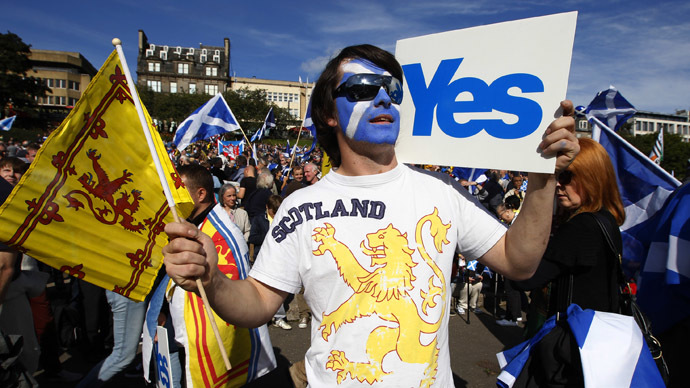‘Westminster’s threats and speculation over Scottish independence are unfounded’

Though the UK government said that Scotland has no strong plans in terms of being independent and threatened the loss of the pound if it secedes, the nation is capable of doing so, Pat Kane told RT, adding that the UK model isn't the best one to follow.
RT:David Cameron promises to boost
Scotland's oil and gas industry with projects worth up to 200
billion pounds, but only if the union stays together. Can
Scotland afford to turn this down?
Pat Kane: I think what Scotland can’t afford to
do is not to look at the example of Norway which is just over the
water from Aberdeen, where both the cabinets were today. That’s
an example of a nation that discovered oil at the same time as
Scotland and is the same size as Scotland, and in the last 40
years has built up a sovereign wealth fund of about 450 billion
pounds. In the same period, Westminster has run up a debt of 1.2
trillion pounds, so I think the example for Scotland to follow is
not any advice that comes from the Cameron cabinet [but] the
example of Norway as how to become a prosperous and sophisticated
small nation with the full benefits of oil and gas.
RT:The UK prime minister also called Alex
Salmond, Scotland's first minister, a ‘man without a plan.' Do
you think he's got what it takes to lead an independent nation?
PK: I think Alex Salmond has proved himself to
be a fine leader of the devolved parliament, and I think he’ll be
a strong leader of the independent parliament. I would hardly say
he’s a man without a plan; the White Paper in Scotland that was
brought out just a few months ago, I think is the most
comprehensive blueprint for an independent nation ever published
– about 650-700 pages. So there’s a plentitude of plans for an
independent Scotland. What we need are the tools and the powers
to bring them into reality – something that isn’t available
passing through Westminster.
RT:A recent poll in northern Scotland (by
the Press and Journal) found that support for independence had
slumped to 17 percent, against 65 percent for 'no.' There's only
seven months to go to the referendum – how can you turn this
around in such a short time?
PK: Well, this is a strange poll because it goes
against the aggregate of polls that we’ve been seeing over the
last two or three months that actually show the 'yes' side
gaining on the 'no' side by about 10 percent. It’s also quite
interesting in terms of the class politics of the independence
vote. Aberdeen is a very rich and affluent area, and it actually
looks as if the more affluent parts of Scotland aren’t as
enthusiastic about independence, but the poorer parts are, so I
think that’s quite an interesting dimension going forward. It’s
not just about Scotland being prosperous, taking itself into the
wider world, but it’s about solving its own internal problems of
inequality as well. Which is a legacy of Thatcherism, Blairism,
and the last several decades of the Westminster government.

RT:UK Chancellor Osborne stressed that an
exit from the UK would also mean loss of the pound for Scotland.
Is that going to be a sticking point for many Scottish people?
PK: I think the stand that Mr. Osborne took a few weeks
ago about ruling out a negotiation on a shared currency is a bit
of a bluff, because I don’t think he has any interest in
destabilizing his own economy, just as Scots have no interest in
general in destabilizing the British economy. I think there will
be pragmatic judgments after a 'yes' vote, to figure out how the
two economies will coordinate and integrate with one another.
Scotland could use the pound on its own of course, but the
British government has to be quite careful because if it starts
to say Scotland can’t use the pound, then Scots can equally say
that we don’t take on the debt. So these are unstable arguments.
I think that the strategy will be post a ‘yes’ to find stability
between the two nations – a sensible arrangement, and I think
probably a currency will happen, but it’s all scaremongering at
the moment to make sure that they get a ‘no’ vote. Wait until you
see what happens after a ‘yes’ vote. I think it will be a
sensible approach.
RT:The EU has said Scotland would have to reapply
for membership in the bloc if it decides to leave the UK - and
success wouldn't be guaranteed. Can the country survive without
both unions?
PK: It’s a strange question. Certainly Mr. Barroso – who
suggested that – has his own problems in his own back yard as a
Spanish politician with the Catalonians. I think it’s quite
strange – well, the thing is when we’ve got other nations coming
into the European Union – Scotland has been harmonized with EU
laws and regulations for the past 40 years. We’re part of what
they call the acquis communautaire. It would be much more
difficult to rip Scotland out of the EU, and much easier to allow
it to gradually harmonize and connect up its institutions and
laws that are already connected up, over the negotiating period
after an independence vote. So I think quite soon after an
independence vote – 18 months, two years – Scotland will be fully
integrated with the EU, because it’s the sensible thing to do.
The statements, views and opinions expressed in this column are solely those of the author and do not necessarily represent those of RT.
The statements, views and opinions expressed in this column are solely those of the author and do not necessarily represent those of RT.












